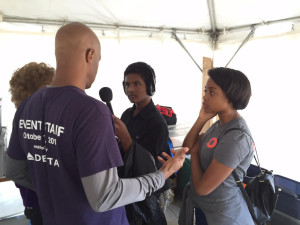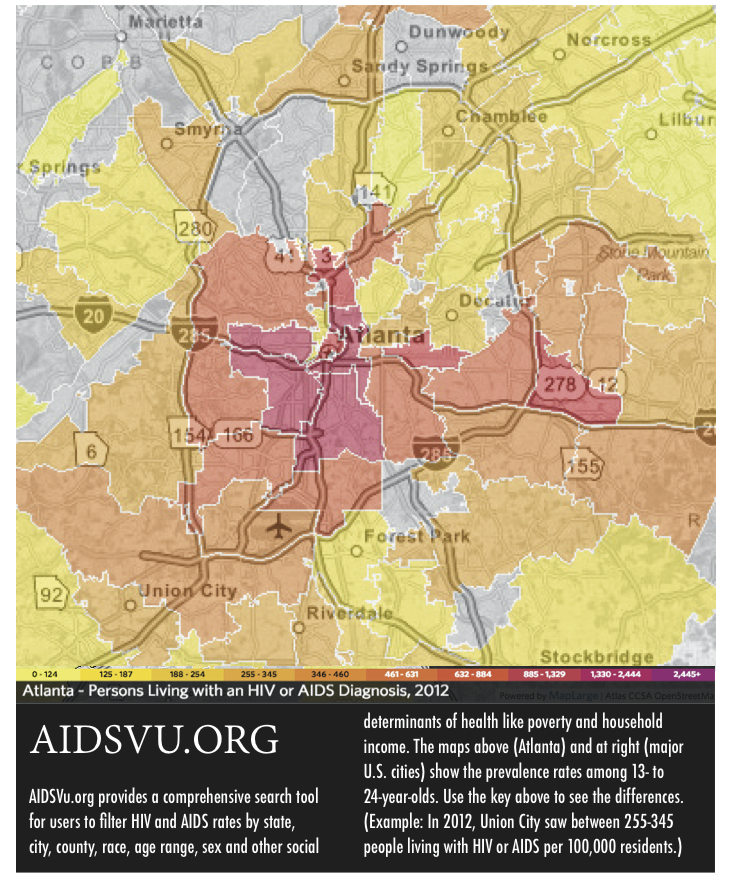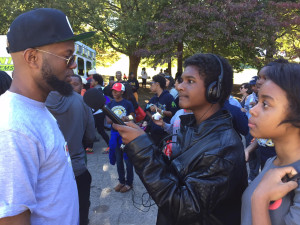Thousands of 13- to 24- year olds in Atlanta don’t know they’re infected. Click here for the audio portion of this story.
March 28, 2010, was LaMar Yarborough’s 18th birthday, and he was laying in the intensive care unit at Grady Memorial Hospital, where he learned he was HIV-positive and later found out he developed AIDS.
“They told me I was diagnosed with AIDS with only five T cells. I didn’t know what this is,” recalled Yarborough, now 23. “I was so sick they thought I was going to die.”
Even though he heard about AIDS in movies, his sex education at home and in school was limited.
“In my family, we were pretty open with sex and things of that nature…but it [was] more so done in a heterosexual way,” he explained, noting that he grew up in a religious household.
Yarborough said at the time he was sleeping with both men and women and thought: “If I’m not going to get a girl pregnant, why use a condom?”
Had Yarborough known earlier about his HIV diagnosis, there is a chance it would not have progressed to AIDS.
According to the Centers for Disease Control and Prevention, “an estimated 9,961 youth (ages 13 to 24) were diagnosed with HIV infection in the United States in 2013.” That’s 21 percent of all people who were diagnosed.
Health experts point to poor sex education as one major factor for the large number of HIV diagnoses among youth.
“I think the reason I didn’t have a big breakdown [when I was diagnosed] is because I didn’t know what the virus was,” Yarborough admitted.
 You’ve got to know what HIV is
You’ve got to know what HIV is
“One of the things the epidemic is showing is how badly we need to increase and improve our education,” said Craig Washington, prevention programs manager with AID Atlanta, a nonprofit that provides prevention, testing and treatment. “We need realistic sex education that deals with the realities about young people having sex and being in relationships, and also being able to have intimacy and a solid connection with each other. This is a natural human way of being. ”
Washington said he believes sex education should start as early as middle school.
Loreen Krug also works at AID Atlanta as the group’s information services program manager. She said she has had a 13-year-old reach out to her, concerned about becoming infected with HIV because he was sexually active.
“Teenagers do this; that’s normal,” Krug said. “We need to make certain the first education is at home. Moms and dads should not be afraid to talk to their children about sex. … We can all get [HIV] just in the blink of an eye.”
Some school districts, like Fulton County Schools, emphasize an abstinence-only education. (See related story page 10.)
Quadir Thomas, who was at the AIDS Walk in Atlanta this fall, lost his aunt to AIDS when he was a young boy.
“When she passed away, it was quick,” he said. “I always wondered, ‘Why did it have to happen to my aunt?’”
Thomas said there needs to be more of a focus on abstinence education in schools, but he also said it is up to parents to educate their kids about sex. He started talking to his 19-year-old son about it when his son was in elementary school.
“If you’re going to engage in that activity, I can’t tie a ball and chain around his ankle, but I try to give him the best knowledge to make the best decisions,” Thomas stated.
Proper education is one way of cutting down on the stigma and rates HIV infections. Health experts say having access to health coverage is another. According to the Kaiser Family Foundation, Medicaid is the largest source of insurance coverage for people with HIV in the U.S. But many states in the South, including Georgia, did not expand Medicaid under the Affordable Care Act, the federal health care law signed by President Obama in 2010.
Nic Carlisle, the executive director of the Southern AIDS Coalition, told Georgia Public Broadcasting that people in these states who do not have access to Medicaid coverage may not develop a doctor-patient relationship to prevent the spread of HIV and AIDS.
LaMar Yarborough has relied on the Ryan White CARE Act for access to his care. Five years after his diagnosis, Yarborough is working to make sure teens in Atlanta never have to go through what he has experienced. This past summer, he started an organization called H.Y.P.E. To Empower, aimed at raising awareness about HIV and AIDS among youth. His group is focused on areas of Atlanta with the highest concentration of infection rates.
“HIV was the best thing that happened to me,” he said. “I know that sounds crazy, but I think to a certain extent it empowered me to empower others and empowered me to love myself more.”
Craig Washington of AID Atlanta said attitudes about HIV and AIDS are shifting among youth.
“Younger people are becoming less bigoted. I think there’s less homophobia,” Washington said. “Younger generations are a reflection of that. At the same time, the stigma is still there, but I think you have a greater possibility of reaching folks as conversations about race, sexual orientation and gender identity become more normal and can free up some attitudes about HIV.”
While treatment and prevention are better than they once were, the virus is still a real problem, especially in Georgia, which leads most states when it comes to cases of new HIV diagnosis, according to Douglas Brooks, the director of the Office of National AIDS Policy at the White House.
“We can’t forget that despite our best efforts, HIV/AIDS remains a very real threat here in Georgia,” Brooks told a crowd this fall at the 25th Annual AIDS Walk at Atlanta’s Piedmont Park. “I’m excited to be working with all of you to change the face of HIV/AIDS in America.”
Miranda and Jason recorded most of their interviews at the 25th Annual AIDS Walk.






Pingback: Portraits of HIV: A college peer educator, an activist, a volunteer, and more - VOX ATL